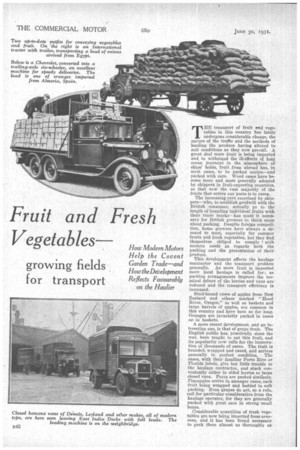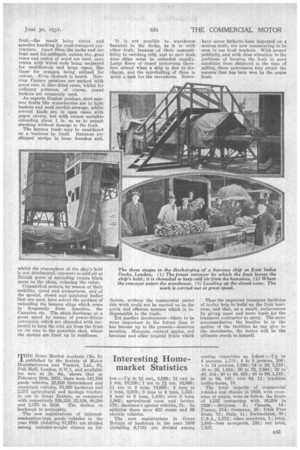Fruit and Fresh
Page 60

Page 61

If you've noticed an error in this article please click here to report it so we can fix it.
Vegetables—
growing fields for transport
BE transport of fruit and 'vegetables in this country has lately undergone considerable change, the nature of the traffic and the methods of hauling the produce having altered to suit conditions as they now prevail. A great deal more fruit is being imported • and to withstand the ill-effects of long ocean journeys in the atmosphere of ships' holds, fruit from abroad has, in most cases, to be packed unripe—and packed with care. Wood cases have become more and more generally adopted by shippers. in fruit-exporting countries, so that now the vast majority of the fruits that enters our ports is in cases.
The increasing pare exercised by shippers—who, to establish goodwill with the British consumer, actually go to the length of branding individual fruits with their trade marks—has made it necessary for British growers to think more about packing. Despite foreign competition, home growers have always a demand to meet, especially for summer fruits and fresh vegetables, but they find themselves obliged to comply = with modern needs as regards both the packing and the presentation of their produce.
This development affects the haulage contractor and the transport problem generally. As more fruit is imported more local haulage is called for: as packing arrangements improve the terminal delays of the lorries and vans arc reduced and the transport efficiency is increased.
Steel-bound cases of apples from New Zealand and others marked "Hood River, Oregon," as well as baskets and large barrels of apples, are common in this country and have been so for long. Oranges are invariably packed in cases on in baskets.
A more recent development, and an interesting one, is that of grape fruit. The English public has, practically since the war, been taught to eat this fruit, and its popularity now calls for the importation Of thousands of -cases. The fruit is branded, wrapped and cased, and arrives generally in perfect coiadition. The cases, with their familiar Porto Rico or Florida labels, give but little trouble to the haulage contractor, and stack conveniently either in sided lorries or large closed vans. Pears are packed similarly. Pineapples arrive in stronger cases, each fruit being wrapped and bedded in soft Packing. Even grapes do not, as a rule, call for particular consideration from tbe haulage operator, for they are generally packed with great care in strong small boxes.
Considerable quantities of fresh vegetables are now being imported from overseas, and it has been found necessary to pack these almost as thoroughly as fruit-the result being easier and speedier handling'for road-transport contractors. Apart from the sacks and net bags used for cabbages, onions, etc., good cases and crates of wood are used, open crates with wired ends being empleyed for cauliflowers and large cases, like those for oranges, being utilized for onions. Even rhubarb is boxed. Newcrop Canary potatoes are packed with great care in fibre-filled cases, whilst for
• ordinary potatoes, of course, round baskets are commonly used.
As regards English produce, most summer fruits like strawberries are in light baskets and need careful stowage, whilst several kinds are in open cases with paper covers, but with corner uprights extending about 1 in. so as to permit stacking without damage to the fruit.
The banana trade may be considered as a business by itself. Bananas are shipped unripe in loose bunches and, whilst the atmosphere of the ship's hold is not detrimental, exposure to cold air at British ports of unloading causes black spots on the skins, reducing the value.
Commerical motors, by reason of their mobility, speed and promptness, and of the special, closed and insulated bodies that are used, have solved the problem of unloading the banana ships which come in frequently from Jamaica, the Canaries, etc. The ships discharge at a great speed by means of power-driven conveyers, which are shrouded with tarpaulin to keep the cold air from the fruit on its way to the quayside shed, where the motors are lined up in readiness.
ft is not possible to warehouse bananas in the docks, as it is with other fruit, because of their susceptibility to catching cold, and to save deck dues ships must be unloaded rapidly. Large fleets of closed motorvans therefore attend when a ship is due to discharge, and the marshalling of them is quite a task for the stevedores. Never
theless, without the commercial motor this work could not be carried on in the quick and efficient manner which is indispensable to the trade.
Yet another development-likely to be more important in the future than it has become up to the present-deserves mention. Mangoes, custard apples, red bananas and other tropical fruits which have never -hitherto been imported on a serious scale, are now commencing to be seen in our fruit markets. With proper publicity, and with close attention to the problems of keeping the fruit in good condition from shipment to the time of selling, these newcomers may attain the success' that has been won by the grape fruit.
Thus the improved transport facilities of to-day help to build up the fruit business, and that, as a result, reciprocates by giving more and more loads for the transport contractor to carry. The more accommodating the haulier is in the matter of the facilities he can give to the merchants, the better will be the ultimate result to himself.




































































































